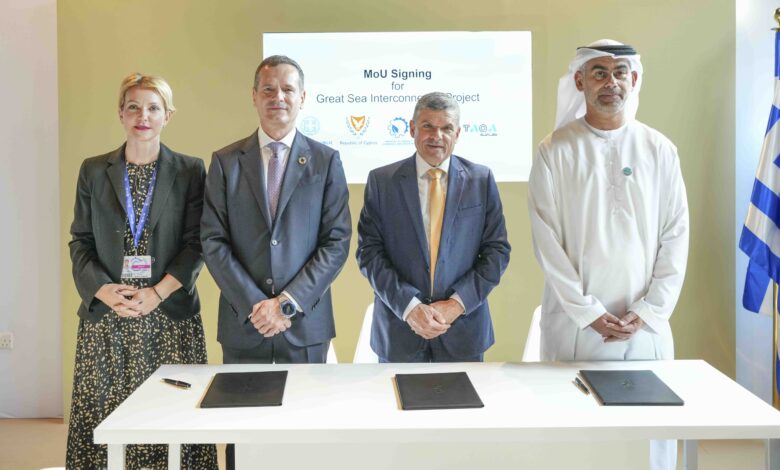TAQA, the Ministry of Energy, Commerce and Industry of Cyprus and the Independent Power Transmission Operator Sign MoU

Abu Dhabi National Energy Company PJSC (TAQA), one of the largest listed integrated utility companies in Europe, the Middle East and Africa, has signed a memorandum of understanding (MoU) to explore the possibility of becoming one of the shareholders in a project to develop a 900km high-voltage direct current (HVDC) electricity interconnection between Greece and Cyprus (the “Project”).
Under the terms of the MoU, TAQA will explore joining Greece’s transmission system operator, Independent Power Transmission Operation of Greece (IPTO) and the Cyprus Government as shareholders in a project whose construction is expected to cost approximately 1.9 billion euro (around AED 7.5 billion).
To mark the occasion, a signing ceremony was held at the 28th United Nations Conference of the Parties (COP28) to the UNFCCC in Dubai, in the presence of H.E. Mr. George Papanastasiou, Cyprus Minister of Energy, Commerce, and Industry, Mr. Manos Manousakis, President and CEO of IPTO, and Mr. Jasim Husain Thabet, TAQA’s Group Chief Executive Officer and Managing Director.
The Project will terminate Cyprus’ energy isolation, increase energy security in the Eastern Mediterranean and encourage the development and export of clean energy to both Cyprus, Greece and the rest of the European Union (EU). Cyprus has significant green energy export potential with the country investing heavily in the flow of clean energy between neighbouring countries and regions. Cyprus and Greece have some of the highest potential for renewable energy in Europe for both solar and onshore and offshore wind power generation, making the two countries ideal locations for a project of this kind.
George Papanastasiou, Minister of Energy, Commerce, and Industry of the Republic of Cyprus, stated: “The Government of Cyprus welcomes the signing of today’s MoU with IPTO and TAQA, which constitutes an additional, pivotal milestone towards the realisation of the electricity interconnection between Cyprus and Greece. As an EU Project of Common Interest, which has already been approved for a 657 million euro grant from the “Connecting Europe Facility”, the interconnection is of crucial importance to Cyprus as its construction will lift our island’s ongoing energy isolation. The project is also key to reaching Cyprus’ wider energy strategy goals of fortifying its energy security, reducing the cost of electricity for the benefit of our economy’s competitiveness, as well as expediting our green transition. The Republic of Cyprus, which is now assessing its own active participation to the project, as shareholder, is confident that the strategic involvement of distinguished and experienced entities such as IPTO and now TAQA, can ensure its timely completion and enhance further the cooperation between Cyprus, Greece and the United Arab Emirates.”
Manos Manousakis, President and Chief Executive Officer of IPTO, stressed: “The agreement that we have signed reflects the high investor interest for the project promoted by IPTO that will be known from now on as the Great Sea Interconnector. The interconnection between Greece and Cyprus, which is the most mature segment, is entering construction phase, beginning from the subsea cable, which will be built by Nexans. We are very much looking forward to a close and fruitful cooperation with all stakeholders in order to expedite a project of strategic importance which enhances the energy security and the green transition in the Eastern Mediterranean, bringing the region closer to the electricity system of Europe”.
Jasim Husain Thabet, Group Chief Executive Officer of TAQA, said: “TAQA is pleased to announce its involvement in another transformative project which will increase energy security and accelerate the deployment of clean energy in the Eastern Mediterranean. As a low-carbon power and water champion, TAQA is committed to investing in the transmission infrastructure needed for the energy transition, enabling decarbonisation and ensuring energy security. HVDC projects are vital to connect clean energy projects to the end users, and we are ambitiously accelerating investment and growth in our infrastructure business to help our stakeholders scale up their clean energy to meet the growing demand for secure, reliable and sustainable power.”
It is estimated that renewable energy capacity needs to triple by 2030 to keep the Paris 1.5C target in sight. This requires significant investment in projects which will enable the flow of clean energy between neighbouring countries and regions.
The interconnection project between Greece and Cyprus is in an advanced stage, with feasibility studies completed, and contracts for two major engineering, procurement and construction (EPC) components have been reserved. In July 2023, NEXANS was awarded a 1.43 billion euro (around AED 5.66 billion) contract for the HVDC cables contract. Furthermore, Siemens AG was appointed as the preferred bidder for the contract to build the two VSC HVDC converter stations for the project.
IPTO who is the promoter of the project is implementing a 5 billion euro (around AED 19 billion) development programme by the end of the decade, which includes not only a series of island interconnections within Greece, but also a series of cross-border interconnections that act as a catalyst for the energy transition. Among the major projects that the Greek TSO is implementing are the Attica-Crete interconnection (one of the biggest and more challenging HVDC projects currently under construction), the interconnections of the Western Cyclades, Dodecanese and the North Aegean islands, as well as the second interconnection with Italy, which will triple the net capacity for the transfer of electricity between Italy and Greece. Furthermore, IPTO is maturing the Green Aegean Interconnector (GAI), a new vertical corridor for the transmission of clean energy generated in the Eastern Mediterranean and the south of Europe directly to major consumption centres and industrial zones in central Europe.




